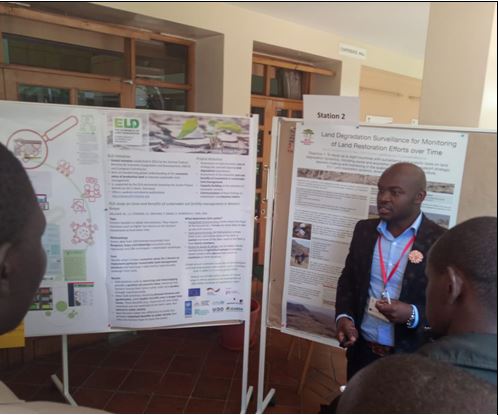
Mr. Lutta Alphayo a PhD student in the department of Land resource management and agricultural technology (LARMAT) presented a poster on “reversing land degradation in Africa by scaling-up evergreen agriculture”’ in the just concluded workshop on “Re-greening Kenya with Trees: Mapping a Collaborative Approach” Workshop at ICRAF. He is also ELD ambassador for Kenya
Regreening Africa is an ambitious five-year project that seeks to reverse land degradation among 500,000 households, and across one million hectares in eight countries in Sub-Saharan Africa. By incorporating trees into croplands, communal lands and pastoral areas, re-greening efforts make it possible to reclaim Africa’s degraded landscapes.
The Economics of Land Degradation (ELD) Initiative together with its partner institutions and Deutsche Gesellschaftfür Internationale Zusammenarbeit (GIZ) GmbH, aims to enhance the national ability of Kenya to assess the economic costs of land degradation and enhance awareness of the economic benefits of investment in Sustainable Land Management (SLM).
This workshop brought together National and County Government officials, Donors, NGOs, Grass-Roots Organizations and Private Sector to: a) review the evidence and benefits associated with integrating trees into agricultural and pastoral landscapes; b) identify opportunities that can be realized through taking agroforestry practices to scale and establishing enabling policy processes; and c) collectively develop a road map for scaling up.
This workshop supports the Government of Kenya’s commitment to restore 5.1 million hectares of land as part of the Bonn Challenge and the Africa Forest Landscape Initiative (AFR100), and the 10% Tree Cover Policy, and contributes to the EU funded Regreening Africa with Trees program, an ambitious five-year project that seeks to reverse land degradation among 500,000 households, and across one million hectares in eight countries in sub-Saharan Africa.
In Kenya, it is anticipated that broader partnerships, local capacity development, evidence-based decision making, and enabling policy processes can bring about the reversal of land degradation with trees on 150,000hectares of land and contribute to food security for some 50,000 households by 2022.
Originally published by the University of Nairobi, see the original post.
